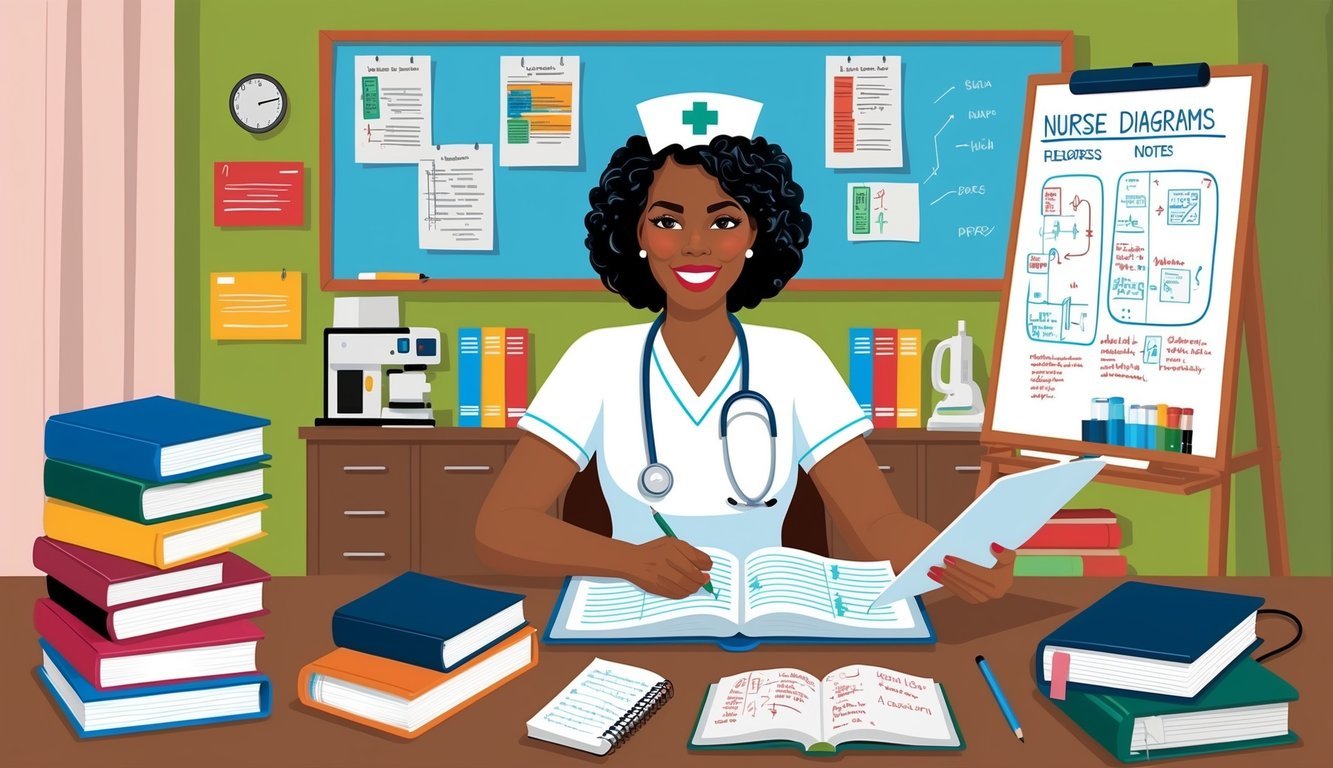Embarking on a nursing career in New York City is an exciting opportunity filled with potential and impact.
To become a nurse in NYC, you must complete an accredited nursing program, pass the NCLEX-RN exam, and obtain a registered nurse license from the New York State Education Department.
This journey requires commitment and hard work, but the rewards are significant, including job security and the chance to make a difference in people’s lives.
Understanding the key steps in the process will not only help you navigate your path effectively but also prepare you for the rigorous demands of the nursing profession.
From selecting a suitable nursing program to fulfilling the necessary licensing requirements, each step plays a crucial role in your success.
For detailed guidance on the application process and specific requirements, refer to resources like All Nursing Schools and NYS Department of Education.
With the growing demand for healthcare professionals in the city, now is the perfect time to explore your options in nursing.
The skills you acquire will not only enhance your professional capabilities but also contribute to the well-being of the diverse communities you serve.
As you take the first steps toward your nursing career, remember that the effort you invest today will shape the compassionate and skilled nurse you aspire to become.
Understanding the Nursing Profession in New York
Becoming a nurse in New York offers a rewarding career path characterized by diverse opportunities.
As a registered nurse (RN), you play a crucial role in healthcare settings, providing essential patient care and support.
To start your nursing career, you need to complete a nursing program that is accredited.
This could be an Associate Degree in Nursing (ADN) or a Bachelor of Science in Nursing (BSN).
Each pathway has its benefits, but a BSN often opens doors to advanced positions and better job prospects.
Key Requirements for RNs in New York
| Requirement | Details |
|---|---|
| Accredited Degree | ADN or BSN from a program approved by the New York State Education Department (NYSED) |
| Licensure Exam | Pass the NCLEX-RN exam |
| Application Fee | $143 for registered nurses |
Nursing education in New York involves rigorous coursework and clinical experience.
You will gain skills in patient assessment, care planning, and collaboration with healthcare teams.
Moreover, the demand for nurses in various specialties continues to grow.
The Bureau of Labor Statistics projects a significant increase in employment for nurses, particularly in urban areas.
As you embark on this journey, explore opportunities for scholarships and grants.
Organizations like the New York State Nurses Association (NYSNA) offer resources to support your educational goals.
This pathway not only contributes to your professional development but also significantly impacts the health and well-being of the community.
Educational Pathways to Become a Nurse in NYC
To pursue a nursing career in NYC, you can choose from various educational pathways, depending on your career goals and time commitment.
Your options primarily include an Associate Degree in Nursing (ADN), a Bachelor of Science in Nursing (BSN), or advanced nursing degrees for further specialization.
Associate Degree in Nursing (ADN)
An Associate Degree in Nursing (ADN) is a popular option for aspiring nurses.
This two-year program is often offered by community colleges and provides a foundational education in nursing.
Through coursework and clinical training, you will cover essential topics such as anatomy, pharmacology, and patient care.
Graduates are eligible to take the NCLEX-RN exam, a requirement for licensure as a registered nurse.
Many nursing schools in NYC offer ADN programs, which can provide a quicker route into the workforce.
Additionally, some institutions allow for flexibility through online nursing degree options, catering to those balancing work or personal commitments.
Bachelor of Science in Nursing (BSN)
The Bachelor of Science in Nursing (BSN) typically requires four years of study and is highly regarded in the healthcare field.
This comprehensive program includes in-depth coursework and extensive clinical experience.
A BSN education covers advanced nursing practices, leadership skills, and community health, preparing you for a broader range of roles in the nursing sector.
Many employers prefer or require a BSN, as it signifies a higher level of training.
Accelerated BSN programs are available for individuals who already hold a bachelor’s degree in another field.
This can reduce the time needed to earn your nursing degree significantly.
Online options for BSN programs can also offer additional flexibility.
Advanced Nursing Degrees
If you’re looking to advance your nursing career further, pursuing an advanced degree may be the right choice.
A Doctor of Nursing Practice (DNP) is one of the highest educational credentials available.
DNP programs focus on clinical expertise, healthcare leadership, and evidence-based practice, preparing you for advanced roles such as nurse practitioners or clinical nurse specialists.
These programs typically require a BSN as a prerequisite and can be completed in a combination of online and in-person formats.
Specialized programs may focus on areas like family health, pediatrics, or psychiatric nursing, tailoring your education to your career ambitions.
Licensing Requirements for Nurses in New York
To become a nurse in New York, you must meet specific licensing requirements that include passing exams and completing necessary clinical experience.
Understanding these steps helps ensure you are well-prepared for a successful nursing career in the state.
NCLEX-RN Examination
The NCLEX-RN (National Council Licensure Examination for Registered Nurses) is essential for obtaining your nursing license.
This standardized exam tests your knowledge and skills in various nursing areas, including patient care, safety, and health promotion.
You must register for the exam with the National Council of State Boards of Nursing (NCSBN) and pay the associated fees.
After registration, you will receive an Authorization to Test (ATT), allowing you to schedule your exam date.
Familiarize yourself with the exam content outline and consider using review courses or practice questions.
This will help you prepare effectively for the exam’s required passing standard to ensure you can become a registered nurse in New York State.
Applying for a Nursing License
Once you pass the NCLEX-RN exam, you can apply for your nursing license through the New York State Education Department (NYSED).
The application process includes submitting a completed application form, proof of your nursing education, and the appropriate fees, which vary by profession.
Make sure to include verification of your NCLEX-RN passing status.
You will also need to provide transcripts from your nursing program and any additional documentation required by NYSED.
Ensure that your application is complete to avoid delays.
NYSED’s review process can take several weeks, so timely submission is crucial to facilitate a smooth transition into your nursing career.
Clinical Experience
Clinical experience is a vital component of your nursing education.
During your nursing program, you will complete clinical rotations where you practice hands-on nursing under the supervision of licensed professionals.
This experience allows you to apply theoretical knowledge in real-world situations.
These rotations typically cover various settings, including hospitals, long-term care facilities, and community health organizations.
Engaging actively in these rotations enhances your skill set and prepares you for diverse nursing challenges.
Upon completion of your nursing program and clinical experience, you will be well-equipped to meet the demands of nursing practice and provide high-quality care to your patients.
Career Opportunities for Registered Nurses in NYC
New York City offers a dynamic landscape for registered nurses, with diverse employment settings and specializations.
As you explore your nursing career, understanding advanced practice roles will also enhance your career trajectory and opportunities.
Employment Settings and Specializations
Registered nurses in NYC can find employment across various healthcare facilities, including hospitals, clinics, and long-term care facilities.
Each setting offers unique challenges and specializations.
Common areas of specialization include:
- Pediatrics: Focusing on the care of infants, children, and adolescents.
- Geriatrics: Catering to the elderly population with an emphasis on chronic disease management.
- Critical Care: Working in intensive care units (ICUs) providing care for critically ill patients.
According to NYC Health + Hospitals, the largest public health system, you can serve over a million patients annually, which opens pathways in outpatient, inpatient, and specialty care.
Explore your options based on your interests and skills.
Advanced Practice Roles
Advancing your nursing career could lead you to pursue roles as Advanced Practice Registered Nurses (APRNs).
In NYC, this includes positions such as:
- Nurse Practitioners (NPs): Providing primary, acute, and specialty care. NPs can focus on specific areas like pediatrics or family medicine.
- Certified Nurse Midwives (CNMs): Specializing in women’s health and childbirth, offering comprehensive care throughout pregnancy.
- Nurse Anesthetists (CRNAs): Experts in anesthesia care for surgical operations.
These roles typically require additional education and certification but significantly increase your scope of practice and earning potential.
Advanced practice roles can enhance your ability to impact patient care positively while expanding your career options in NYC.
Continuing Education and Career Advancement

Continuing education is vital for nurses in New York City, allowing you to advance your career while staying current with best practices.
Participating in continuing education programs can enhance your skills and expand your professional opportunities.
You can earn your Bachelor of Science in Nursing (BSN), which often positions you for leadership roles.
Institutions like Columbia University School of Nursing and Pace University Lienhard School of Nursing offer robust BSN programs.
If you’re considering furthering your education, a Doctor of Nursing Practice (DNP) is another option.
This terminal degree emphasizes clinical practice, preparing you for advanced roles in healthcare settings.
Pathways for Advancement
| Program Type | Description | Key Institutions |
|---|---|---|
| Continuing Education | Short courses to meet licensure requirements | NYC Health + Hospitals |
| Bachelor of Science in Nursing (BSN) | Undergraduate degree focusing on nursing principles | Columbia University, Pace University |
| Doctor of Nursing Practice (DNP) | Doctoral degree aimed at advanced clinical practice | College of Mount Saint Vincent, Columbia |
By committing to ongoing education, you can improve your competency, qualify for higher-level positions, and ultimately enhance your career trajectory in nursing.
Salary Expectations and the Job Market in NYC

Understanding the salary expectations and job market for nurses in New York City is crucial for anyone considering this career path.
Factors such as economic conditions and individual qualifications play a significant role in determining nursing salaries.
Economic Outlook for Nurses
The demand for nurses in New York City remains strong.
This is because an aging population and ongoing healthcare needs drive the demand.
According to the Bureau of Labor Statistics, registered nurses’ employment is projected to grow significantly in the coming years.
Salary data indicates a wide range of earnings based on experience and specialization.
For instance, registered nurses in NYC earn a median salary of $104,936 as of 2023, with top earners making upwards of $164,106.
The job market is favorable, particularly in areas like Riverdale and Long Island City, where healthcare facilities are expanding.
Factors Influencing Nursing Salaries
Several key factors influence nursing salaries in New York.
These include:
- Experience: Nurses with more experience typically command higher salaries.
- Specialization: Nurses with specialized skills, such as nurse anesthetists or nurse practitioners, often earn significantly more.
A table summarizing the salary ranges for registered nurses in NYC may illustrate this clearly:
| Percentile | Salary |
|---|---|
| Bottom 10% | $16,948 |
| Median | $104,936 |
| Top 10% | $164,106 |
Additional factors such as education level, the institution of employment, and specific geographic locations within NYC can further affect your earning potential.
Understanding these variables helps you align your career objectives with realistic salary expectations in the dynamic New York nursing job market.
For more detailed salary insights, consider visiting Nurse.com and NursingProcess.org.

